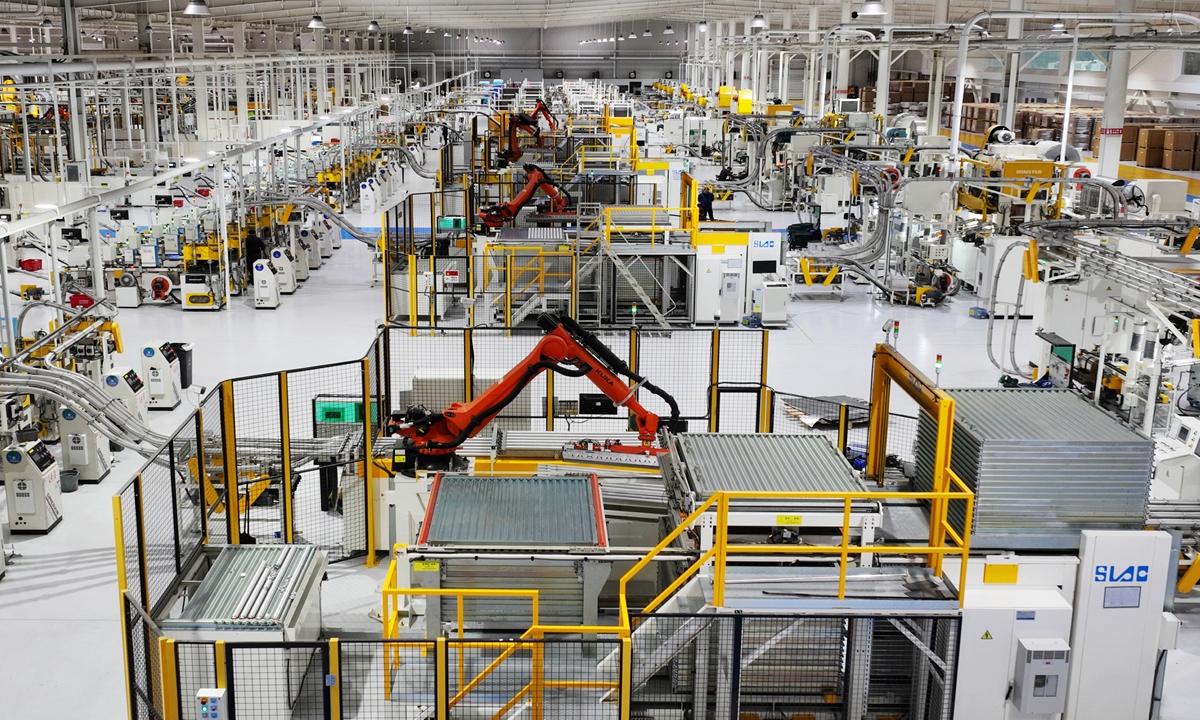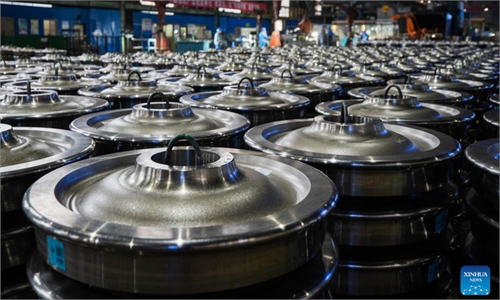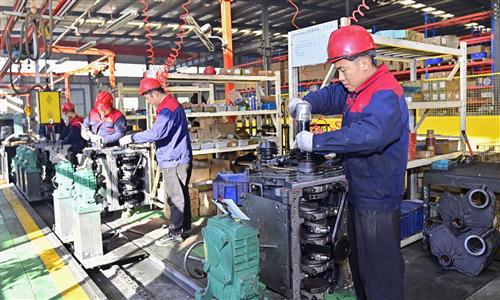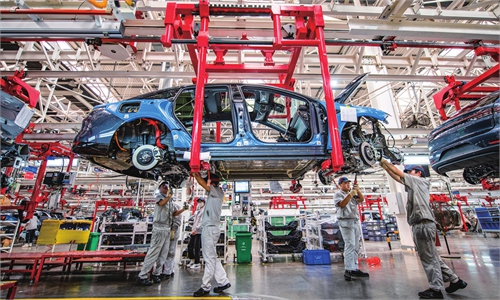

Industrial robots are operating on an intelligent production line in a smart manufacturing enterprise in Yangzhou, East China's Jiangsu Province. Photo: VCG
Last year, Chinese enterprises including major technology brands expanded their footprint on the global market. It was also the first year for upgraded versions of "Made in China" to compete in the markets of the developed economies in all aspects.
In 2023, China's foreign trade and investment rose steadily, with a trade surplus of more than $730 billion in the first 11 months. China was the only major economy with an inflation rate lower than the central bank's 2-percent target.
In retrospect, in the fields of semiconductors, artificial intelligence, new-energy vehicles or batteries, the technological value of Chinese manufacturing was increasingly recognized globally. In the second half of the year, many Silicon Valley entrepreneurs chose to return to China, seeking cooperation with the world's largest factory, known for its high manufacturing efficiency and growing competitiveness.
In 2024, the globalization of the high-tech sector will be irreversible, and Chinese high-tech companies will continue to "go global." There will be more and more Chinese companies setting up factories in both the developed and developing economies, and concurrently, there will also be an increasing number of young Chinese entrepreneurs appearing on the international business stage.
The rapid development of the Chinese economy over the past 45 years can be attributed to the reform and opening-up policy. Maintaining a competitive advantage in the global manufacturing industry is crucial for China's industrial transformation and upgrading of the economy, as well as ensuring the stability of the yuan's exchange rate and the well-being of the public in the face of global challenges.
The development of Chinese economy demonstrates that China's goal is not to "dominate the world", but to share the dividends of its development. This explains why China's foreign policies won't follow the heels of the traditional colonial powers by bullying the weak and poor, and China's contributions have been widely recognized by countries and regions participating in the Belt and Road Initiative (BRI).
Under the long-term goal of maintaining steady and sustainable development, the Chinese economy saw a robust recovery in 2023. In addition to effectively controlling inflation, various indicators such as electricity generation, transportation of goods and passengers and retail sales all exhibited a gradual recovery, surpassing market expectations.
The improved economic data can be attributed to the continuous implementation of policies such as poverty alleviation, the BRI and the development of high-end manufacturing. They also stem from the continuous improvement in the capital intensity of modern agriculture and manufacturing, offsetting insufficient growth momentum caused by a slowdown in the real estate sector.
Investors' expectations for the economy's future are diverging. There is a common saying in the international investment community: "optimists tend to be successful and pessimists tend to be right." China's market size and development potential are enormous, and only optimistic entrepreneurs who keep up with the times can get their due rewards.
The main battlefield of competition for Chinese companies has long expanded from first- and second-tier Chinese cities to county towns, which benefits more Chinese consumers, as brands and consumption patterns that used to only exist in Beijing, Shanghai, Guangzhou and Shenzhen are increasingly entering local towns and rural areas.
The upgrading of the financial industry will also be an important aspect of the Chinese economy in 2024. Commercial banks such as China Agricultural Bank, Industrial and Commercial Bank of China and China Construction Bank have all lowered their deposit interest rates, which for the first time are below the benchmark interest rate set by the People's Bank of China.
This is a new milestone in Chinese financial history. It signifies that China has transitioned from a period of relying on foreign investment during the early stages of reform and opening-up to a new stage where domestic capital is abundant.
The author is the vice president of Yongxing Securities. bizopinion@globaltimes.com.cn



